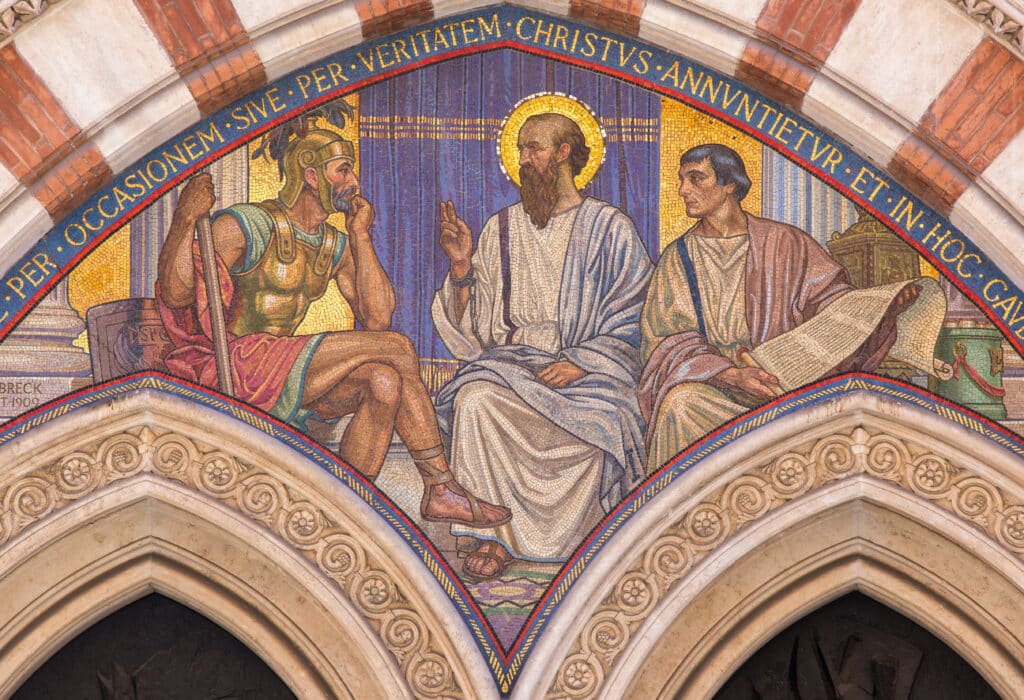*Author’s Note: Paul’s encounter with Christ led him to a greater understanding of the faith, and from that encounter, Paul developed a theology of mission that affected everything about him, specifically in four areas:
- The nature of his call and conversion, and his role as an apostle to the Gentiles,
- Paul’s gospel-centered preaching, building on Old Testament promises, fulfilled in the death, burial, and resurrection of Christ,
- Paul’s practice of contextualization, in both church planting and disciple making, and
- Paul’s experience of persecution and suffering for the sake of Christ, in which he chose to boast.
Each of these contributes to the missiology of Paul, and from them, we can learn much about God’s missio Dei, his desire to reach all nations with the good news of Jesus Christ, and the offer of salvation he extends to each of us. In this article, we’ll explore the nature of Paul’s gospel-centered preaching, and how this formed Paul’s theology of mission.
Paul was called to preach the gospel during his encounter with Christ on the Road to Damascus. In order to understand Paul’s missiology fully, we must examine the components of his message to all peoples, Jew and Gentile alike:
- It is a remarkable message,
- It is rooted in God’s promise to Abraham,
- It is realized in the death, burial, and resurrection of Christ,
- It offers reconciliation between humanity and God, and
- It is a rejection of idolatry and things that are not of God.
The Remarkable Gift of Grace
The gospel message that Paul preached was truly a remarkable message. Perhaps the thesis of Paul’s letter to the Romans says it best: “For I am not ashamed of the gospel, for it is the power of God for salvation to everyone who believes, to the Jew first and also to the Greek. For in it the righteousness of God is revealed from faith for faith, as it is written, ‘The righteous shall live by faith’” (Romans 1:16-17).[1]
God’s incredible offer of salvation is extended freely to all of humanity.[2] Paul calls it a “gift,” and uses that term—and others like it—frequently in his letters.[3] In fact, a common Greek word in the New Testament (charis) is a word that means “gift” or “favor,” but is most often translated as “grace.” Paul uses both of these terms to describe the free and unmerited favor of God, given to mankind as an expression of his love and generosity.
In Romans 5, Paul contrasts the gift of God with the consequences of sin (Romans 5:15-17) and describes how God’s gift of grace far exceeds our transgressions. Through Adam’s sin, he explains, sin entered the world, and death reigned. But the gift of God—grace—is found in Christ and provides the opportunity to receive forgiveness and life.
“Paul contrasts the gift of God with the consequences of sin and describes how God’s gift of grace far exceeds our transgressions.”
These two terms are connected again in Ephesians 2, where Paul states, “For by grace you have been saved through faith. And this is not your own doing; it is the gift of God” (Ephesians 2:8, ESV). Again, God’s offer of redemption through salvation comes as a gift because of God’s grace. It is not by our own achievement that we receive it, nor is it a reward for our efforts. It is a freely given gift from God.[4] It is truly a remarkable message!
Rooted in the Abrahamic Promise
Paul’s gospel message is also firmly rooted in the promise of God to Abraham. In Genesis 12, God tells Abraham, “I will make of you a great nation, and I will bless you and make your name great, so that you will be a blessing… and in you all the families of the earth shall be blessed” (Genesis 12:1-3). This promise is reiterated in Genesis 22, where God says, “In your offspring shall all the nations of the earth be blessed” (Genesis 22:16-18, ESV). Both of these statements show that God’s intention all along was for Abraham’s descendants to extend his blessing to all the peoples of the earth. This is what forms the foundation of Paul’s commission to the Gentiles.
He describes this in detail in Galatians. Here, Paul explicitly links the universal nature of God’s promise to Abraham to any who place their faith in Christ. This is the heart of the message of the gospel, given to Abraham so long ago.[5] The promise of God to Abraham does not refer only to his physical descendants. Paul makes the strong argument that anyone—Jew or Gentile—who places their faith in Christ becomes a spiritual descendant of Abraham, and thus a recipient of the promise.[6]
It was, after all, Abraham’s faith[7] that was credited to him as righteousness (Galatians 3:6), and not his obedience to the law. Since Abraham’s blessing came by faith, those who place their faith in Abraham’s “seed” (Galatians 3:16), whom Paul identifies as Jesus Christ, can also receive this gift and blessing. So, no longer is it by biological descent; through the Spirit, all have an equal opportunity to be included in Abraham’s blessing and promise.[8]
“Through the Spirit, all have an equal opportunity to be included in Abraham’s blessing and promise.”
It was the redemptive work of the cross that made this possible (Galatians 3:13-14). Through the sacrifice of Christ, the curse of the law was removed.[9] Anyone who places their faith in Christ can become children of God and heirs of the promise (Galatians 3:26-29). This adoption is not based on ethnicity or genetics,[10] nor on obedience or adherence to the law, but solely upon faith in Christ. What Paul stresses in this passage is the hope and inclusion the Gentiles have because of God’s promise, accomplished through Christ’s work on the cross.
Paul sees the message given to him by Christ as the fulfillment of the promise made to Abraham.
“The Christocentric thrust of the Abraham story is apparent, because the promise of the blessing to Abraham is actualized only in Christ, who as Abraham’s exclusive seed (v. 16) fulfills the promise and breaks the curse of the law (vv. 13-14). His death on the tree allows the promise to flow to the Gentiles, and his exclusive status as ‘seed of Abraham’ (and ‘son of God,’ cf. Gal. 4:4) actualizes faith (Gal. 3:23-26).”[11]
This promise was made to all peoples. It was never meant to be exclusively Israel.[12] The physical descendants of Abraham, and even Abraham himself, were only the channel through which the blessing and promise would flow.[13]
“The physical descendants of Abraham, and even Abraham himself, were only the channel through which the blessing and promise would flow.”
Realized in the Death, Burial, and Resurrection
If the message of the gospel was formed and grounded in the Abrahamic promise, it is only fully realized in the death, burial, and resurrection of Jesus. This too, forms a central emphasis of Paul’s preaching and a core element of his theological framework.
Paul frequently stresses the centrality of the work of Christ on the cross in his correspondence with the Corinthian church. He makes such declarations as “We preach Christ crucified” (1 Corinthians 1:22), “I decided to know nothing among you except Jesus Christ and him crucified” (1 Corinthians 2:2), and “I delivered to you as of first importance what I also received: that Christ died for our sins in accordance with the Scriptures, that he was buried, that he was raised on the third day in accordance with the Scriptures” (1 Corinthians 15:3-4, emphasis mine). Certainly, this is a foundational part of Paul’s message.
In 1 Corinthians 15, Paul mentions three key elements of the cross that are striking and worth examining.[14] First, Paul mentions the death of Christ. Paul understands Christ’s death to have accomplished our atonement and redemption. God demonstrated his love for humanity by sending his Son to be a sacrifice for each of us (Romans 5:8; John 3:16).
“God demonstrated his love for humanity by sending his Son to be a sacrifice for each of us.”
This is foreshadowed throughout the Old Testament in the Levitical sacrificial system. The Jewish people needed a way to atone for their sins, and something was needed to pay the price. However, animal sacrifice was a temporary measure at best (Hebrews 10:4). “Hence, either humanity would have to pay for their wrongs by suffering eternal hell, or God himself would have to pay for this wrong. This is what God did by becoming a man and dying on the cross.”[15] Paul says it this way: “He made him to be sin who knew no sin, so that in him we might become the righteousness of God” (2 Corinthians 5:21, ESV).
Christ’s death also ensured our redemption from the power of sin in our lives. In his discussion of Abraham’s promise in Galatians 3, Paul states, “Christ redeemed us from the curse of the law by becoming a curse for us” (Galatians 3:13, ESV). What Jesus accomplished in his death fulfilled the requirements of the law, releasing believers from its curse, and opening the way for the Abrahamic promise to be fully enacted.
Second, Paul lists the burial of Jesus. This detail can be often overshadowed by the death and the resurrection, but it’s critical for Paul’s message. Through his death, Jesus is able to identify with humanity. But the burial also serves to pave the way for the physical resurrection of Christ. “What goes down in burial comes up in resurrection.”[16] The burial proves that Christ’s death was real.
“Through his death, Jesus is able to identify with humanity.”
Third, Paul adds the cornerstone of his theology, the resurrection. Paul so strongly believes in this that he forcefully says, “If Christ has not been raised, then our preaching is in vain and your faith is in vain.…And if Christ has not been raised, your faith is futile and you are still in your sins. Then those also who have fallen asleep in Christ have perished” (1 Corinthians 15:14, 17-18, ESV).
This is the central piece of Paul’s theology, because if the resurrection did not occur, then a person can live life however they desire. Jesus would have been no better than a false prophet or a liar. But if Christ did rise from the dead, then he is who he claims to be, and the resurrection is the proof we need.[17] That carries serious implications for every person. If Christ has been raised, then we can be too. “We were buried therefore with him by baptism into death, in order that, just as Christ was raised from the dead by the glory of the Father, we too might walk in newness of life” (Romans 6:4, ESV). The resurrection not only secures victory over sin, but offers new life in Christ.
Reconciliation to God
Closely connected to the work of Christ on the cross is the next element of Paul’s gospel centered message. Jesus’ death reconciled us to God. The theme of reconciliation is an important piece of Paul’s message, and he describes it clearly in his second letter to the Corinthian church, explaining how those who are in Christ have been made new, the old is no more.
“All this is from God, who through Christ reconciled us to himself and gave us the ministry of reconciliation; that is, in Christ God was reconciling the world to himself, not counting their trespasses against them, and entrusting to us the message of reconciliation.…We implore you on behalf of Christ, be reconciled to God.” (2 Corinthians 5:17-20, ESV)
Mankind has been alienated from God, the relationship has been broken; in fact, the word “alienation” itself implies enmity.[18] Mankind’s sin has caused a breach in the relationship with God. What is most remarkable about this is the fact that the one who caused this breach is man, yet it is God who makes the first move toward reconciling the relationship.[19] God initiates reconciliation.
“What is most remarkable about this is the fact that the one who caused this breach is man, yet it is God who makes the first move toward reconciling the relationship.”
Paul makes a very similar argument in Romans 5:6-11, but it is in Colossians that he describes this concept most vividly. In a captivating passage, Paul describes the fullness of our relationship with Christ, and pairs it with the fellowship we have with him, and the freedom we experience in him.[20] Christ canceled the record of our debt, and he nailed it to the cross (Colossians 2:8-15). Christ took up our sin and took it to the cross where the matter was settled once and for all.
Not only did Paul hold this as a key part of his gospel-centric message, but he also instructs that every believer is to play a part in the reconciliation process, calling believers to be ambassadors of the ministry of reconciliation (2 Corinthians 5:18), sharing the message of God’s love with others. This not only leads others to Christ but also participates in the sanctification process in our own lives.
Rejection of Idolatry
A final element of Paul’s gospel-centric preaching is the rejection of idolatry and false gods. This is an essential aspect of Paul’s Gentile ministry that may not have been as prominent to those serving in more Jewish settings due to the nature of the cultures that Paul sought to reach. His call and commission took him to regions of the world where idolatry was commonplace; before his hearers could fully turn to the gospel, he had to show them why they must reject their gods “who are not gods at all” (Acts 19:26, NASB). Paul consistently addresses this issue in his epistles, because idolatry has a profoundly negative impact on humanity’s understanding of God, producing disorder in every aspect of life.[21]
“A final element of Paul’s gospel-centric preaching is the rejection of idolatry and false gods.”
Paul describes the downward spiral of rejecting God in Romans 1, showing how idolatry stems from this rejection, leading to replacing God with manmade images (Romans 1:21-23). This only distorts our relationship with God, leading to blatant immorality, and is an offense against the very sovereignty and righteousness of God.
There are several elements to this aspect of Paul’s theology.
First, Paul’s gospel is centered on the actions of Christ on the cross, and through him is the only way we can be redeemed and reconciled (John 14:6; 2 Corinthians 5:20). Idolatry is contradictory to the fact that Christ alone is to be worshipped. In effect, replacing true worship with lifeless, man-made representations dilutes our worship of God.[22]
In addition, the gospel calls believers to be transformed and made holy, conforming to the image of God’s Son (Romans 8:29). Idolatry hinders such growth, preventing believers from fully turning their hearts toward Christ. Moreover, idolatry does not produce unity; it only divides, as different cultures or groups of people look to their respective idols. This simply undermines the spirit of oneness that Christ desires for those who follow him (1 Corinthians 8:5-6). And finally, Paul makes clear that to participate in idolatry is to participate with demons (1 Corinthians 10:20-21).[23]
“The gospel calls believers to be transformed and made holy, conforming to the image of God’s Son.”
Idolatry reverses the created order of things. “God, who should be worshiped, becomes an object to be used; creation, which is for our use and blessing, becomes the object of our worship.”[24] Idolatry pulls our attention away from the living God, to whom we belong because of Christ’s redeeming actions on the cross. These two actions are contradictory and incompatible.[25]
One final statement must be made in relation to the gospel-centric nature of Paul’s message. Paul’s letters reveal his utter dependence upon the Holy Spirit in everything. The success of his efforts, and even the cohesive nature of his missiology, cannot be understood outside of God’s supernatural activity through the Holy Spirit in and through Paul.[26] Without this essential piece, the success of Paul’s life and work simply cannot be explained.
[1] All Scripture references are from the English Standard Version, unless otherwise noted.
[2] Leon Morris, The Epistle to the Romans, A Pillar Commentary (Grand Rapids: Eerdmans, 1994), 67. The term salvation is all-encompassing, including justification, redemption, sanctification and more.
[3] John M. G. Barclay, Paul and the Gift (Grand Rapids: William B. Eerdmans Publishing Company, 2017), 1.
[4] John R. W. Stott, The Message of Ephesians: God’s New Society, ed. John R. W. Stott, The Bible Speaks Today (Leicester, Downers Grove: Inter-Varsity Press, 1986), 83-84.
[5] Walter C. Kaiser, The Messiah in the Old Testament, Studies in Old Testament Biblical Theology (Grand Rapids: Zondervan, 19950, 47.
[6] John R. W. Stott, The Message of Galatians: Only One Way, ed. John R. W. Stott, The Bible Speaks Today (Leicester, Downers Grove: Inter-Varsity Press, 1986), 73.
[7] E. Earle Ellis, Paul’s Use of the Old Testament (Eugene: Wipf and Stock, 2003), 25.
[8] Sam K. Williams, “Promise in Galatians: A Reading of Paul’s Reading of Scripture,” Journal of Biblical Literature 107, no. 4 (December 1988): 720.
[9] Johan Christiaan Beker, Paul the Apostle: The Triumph of God in Life and Thought (Philadelphia: Fortress Press, 1992), 48-49.
[10] Ellis, Paul’s Use of the Old Testament, 138.
[11] Beker, Paul the Apostle, 56.
[12] Dean S. Gilliland, Pauline Theology and Mission Practice (Eugene: Wipf and Stock, 1998), 73.
[13] Kaiser, The Messiah in the Old Testament, 48.
[14] Paul actually includes a fourth item to his list in 1 Corinthians 15, the appearances to multiple individuals and groups, and lastly, to Paul. I have chosen to focus only on the first three here, the death, the burial, and the resurrection.
[15] Gregory A. Boyd and Paul Rhodes Eddy, Across the Spectrum: Understanding Issues in Evangelical Theology (Grand Rapids: Baker Academic, 2022), 115.
[16] Gary R. Habermas and Mike Licona, The Case for the Resurrection of Jesus (Grand Rapids: Kregel Publications, 2004), 155.
[17] Habermas and Licona, The Case for the Resurrection of Jesus, 27.
[18] Paul Barnett, The Message of 2 Corinthians: Power in Weakness, ed. John R. W. Stott, The Bible Speaks Today (Leicester, Downers Grove: Inter-Varsity Press, 1988), 115.
[19] Barnett, The Message of 2 Corinthians, 116.
[20] R. C. Lucas, The Message of Colossians and Philemon: Fullness and Freedom, ed. John R. W. Stott, The Bible Speaks Today (Leicester, Downers Grove: Inter-Varsity Press, 1984), 99-110.
[21] Christopher J. H. Wright, The Mission of God: Unlocking the Bible’s Grand Narrative (Downers Grove: InterVarsity Press, 2018) 143.
[22] Wright, The Mission of God, 152.
[23] Wright, The Mission of God, 162.
[24] Wright, The Mission of God, 165.
[25] Gordon D. Fee, The First Epistle to the Corinthians, The New International Commentary on the New Testament (Grand Rapids: W.B. Eerdmans Publishing Company, 1987), 473.
[26] Paul E. Davies, “Paul’s Missionary Message,” Journal of the American Academy of Religion XVI, no. 4 (1948): 210-211.











